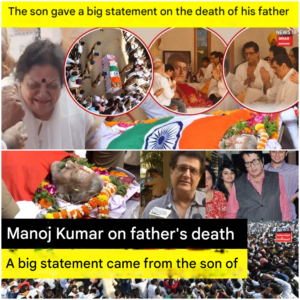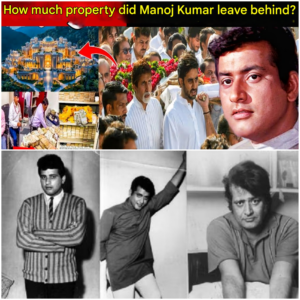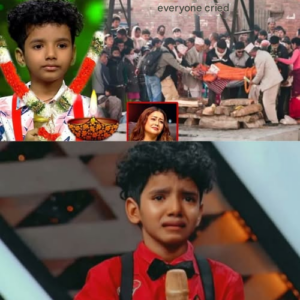Visit Manoj Kumar’s House in Mumbai | Manoj Kumar Family | Shocking Facts!
.
.
.
play video:
Inside Manoj Kumar’s Home in Juhu: A Final Glimpse Into the Life of Bharat Kumar After His Passing
On April 4, 2025, India bid farewell to one of its most beloved and iconic figures, Manoj Kumar—popularly known as “Bharat Kumar.” His death marked the end of an era in Indian cinema, but also sparked a wave of emotion across the country, with thousands remembering the man who gave voice to patriotism through film.
Following his cremation at the Pawan Hans Crematorium in Mumbai, attention turned to the place that was once his sanctuary—his home in Juhu. A place filled with memories, where India’s Bharat Kumar lived out his final days surrounded by his loving family.
This article takes you on a heartfelt journey into Manoj Kumar’s final home, the mood surrounding it after his passing, and the life he lived behind closed doors.
The Home Where a Legend Lived
Located on N.S. Road No. 11 in Juhu, Mumbai, Manoj Kumar’s residence is part of the Goswami Tower—named after his original surname, Harikrishna Goswami. He lived in this modest yet dignified building with his wife, Shashi Goswami, and their family for decades.
Situated on the third floor of the tower, this apartment bore silent witness to the life and times of a man who once ruled Bollywood and the hearts of millions. Despite owning prime real estate in Mumbai, Kumar always preferred a life of simplicity.
Following his cremation, a large crowd gathered outside Goswami Tower. Police were stationed in high numbers to manage the ongoing stream of visitors—family members, industry colleagues, and fans, all arriving to pay tribute.
Large posters of Manoj Kumar adorned the entrance. The silence in the neighborhood was profound, broken only by the murmurs of those reminiscing about the actor’s legacy.
Fans Gather to Mourn the Icon
Even after his body had been taken for the final rites, fans continued arriving outside his residence. Some lit candles, some recited prayers, and many simply stood in silence with folded hands.
Among them were auto-rickshaw drivers with Manoj Kumar’s portraits pasted on their vehicles, young fans who had only seen his films on television, and elderly couples who had grown up idolizing him.
A five-minute silent prayer was observed by a group of late-arriving fans—marking their own private tribute to the man they saw as the soul of patriotic Indian cinema.
Police Deployment and Celebrity Visits
Because of the high-profile nature of Manoj Kumar’s life and the volume of public interest, the Mumbai Police had deployed a significant force outside his home. Police vans and patrolling officers were visible at all times.
Several Bollywood celebrities, including Amitabh Bachchan, Subhash Ghai, Salim Khan, and Prem Chopra, were spotted visiting the family to offer condolences. Inside, his wife Shashi was seen in tears—surrounded by loved ones, including their sons Kunal and Vishal Goswami.
The atmosphere was somber, respectful, and deeply emotional. The media, though present, maintained a respectful distance while reporting on the crowd and mood outside.
The Man, The Home, The Legacy
Manoj Kumar’s home was more than just bricks and mortar—it was a symbol of the life he built, both personally and professionally. Despite achieving tremendous fame and financial success, he chose to stay away from excessive luxury.
Reports estimate that he left behind assets worth over ₹170 crore, including properties in prime locations in Juhu and Bandra. But to those who knew him, it wasn’t his wealth but his values that defined him.
His son Kunal Goswami said it best: “This was papa’s fortress. He was never about glamour. His heart was always in the country, in his words, and in his art.”
A Quiet Life After Stardom
In recent years, Manoj Kumar had receded from the public eye. Once the man who had directors and actors hanging on his every word, he spent his final years in this very home, surrounded by books, scripts, and his family.
Despite suffering from serious health complications—including liver cirrhosis and heart issues—he never complained. His wife Shashi remained his pillar of strength, caring for him round-the-clock with quiet devotion.
Industry insiders say that though he had grown physically weak, his mind was still sharp. He was revisiting his scripts, mentoring his grandson, and watching old patriotic documentaries—still the patriot at heart.
A Personal History Rooted in Simplicity
Born in 1937 in Abbottabad (now in Pakistan), Manoj Kumar’s early life was uprooted during the Partition. His family relocated to Delhi, where he pursued his education at Hindu College, Delhi University.
His dreams of acting led him to Mumbai. Inspired by Dilip Kumar, he changed his name from Harikrishna Goswami to Manoj Kumar. Over time, his cinematic choices aligned with nationalistic themes—earning him the enduring moniker of “Bharat Kumar.”
Films like Shaheed, Upkar, Roti Kapda Aur Makaan, and Kranti made him not just a star, but a movement.
Honored in Life, Revered in Death
Manoj Kumar was a recipient of numerous awards throughout his career:
Padma Shri in 1992
Dadasaheb Phalke Award in 2015
Seven Filmfare Awards for various categories, including Best Director and Best Story
Even as accolades poured in, he remained deeply humble. Those closest to him recall how he would shrug off awards with a gentle smile and say, “These are for the shelf. My real reward is if one boy grows up loving his country because of my films.”
Final Moments at Home
His home in Juhu had seen many seasons—of success, of struggle, of celebration, and of silence. In the days leading up to his death, the house was filled with prayers and whispered conversations.
His grandchildren, whom he adored, were seen sitting beside his bed listening to the stories of Bhagat Singh and Azad—two of his favorite historical figures.
According to family sources, Manoj Kumar’s last words were a blessing to his family: “Be good. Be strong. Love your country.”
What Happens to His Home and Legacy Now?
The family has reportedly decided to preserve his third-floor residence in Goswami Tower as a memorial space. Plans are underway to convert a part of it into a mini-museum, featuring his awards, personal belongings, original film posters, and hand-written scripts.
Kunal Goswami, his son, is expected to manage the estate and continue charitable initiatives under the “Bharat Kumar Foundation”—an organization that will focus on education and cultural preservation.
Final Reflections: A House Full of Memories
As the sun set over Juhu, and the chants of “Bharat Kumar Amar Rahe” faded into silence, one couldn’t help but reflect on the home Manoj Kumar left behind. It wasn’t a palace—but it was a space filled with heart, with love, and with decades of service to art and nation.
It’s rare to find a man who turns a house into a temple of values. Manoj Kumar did just that. And while the lights inside may be dimmed, his presence will forever linger in every corner, every wall, and every frame that bore witness to his journey.
News
How was Manoj Kumar able to keep this secret hidden for 60 years? Manoj Kumar Secret Love Story
How was Manoj Kumar able to keep this secret hidden for 60 years? Manoj Kumar Secret Love Story . . . play video: How Manoj Kumar Kept His Secret Love Hidden for 60 Years In the golden era of Indian…
Fans were in tears when they found out what happened to Avirbhav? Superstar Singer Season 3 | Superstar Singer Avirbhav
Fans were in tears when they found out what happened to Avirbhav? Superstar Singer Season 3 | Superstar Singer Avirbhav. . . . play video: What Really Happened to Avirbhav? Clearing the Air on the Superstar Singer Season 3 Winner’s…
Manoj Kumar News Update: Son gave a big statement on father’s death | Manoj Kumar Son
Manoj Kumar News Update: Son gave a big statement on father’s death | Manoj Kumar Son. . . . play video: Manoj Kumar News Update: Son Kunal Goswami’s Heartfelt Tribute—What Was Said at the Funeral of India’s ‘Bharat Kumar’ The…
How much property did Manoj Kumar leave behind? Who will be the owner? Manoj Kumar Net Worth
How much property did Manoj Kumar leave behind? Who will be the owner? Manoj Kumar Net Worth . . . play video: Bharat Kumar’s Final Bow: The Life, Death, and Legacy of Manoj Kumar—What He Left Behind The Indian film…
Manoj Kumar had become like this in his last days, this dangerous disease took his life! Manoj Kumar Death Reason
Manoj Kumar had become like this in his last days, this dangerous disease took his life! Manoj Kumar Death Reason . . . play video: End of an Era: The Final Days and Legacy of Manoj Kumar, Bollywood’s ‘Bharat Kumar’…
Avirbhav – Superstar Singer 3 winner Avirbhav performs the final song!
Avirbhav – Superstar Singer 3 winner Avirbhav performs the final song! . . . play video: Avirbhav’s Grand Finale Triumph – The Voice That Moved a Nation in Superstar Singer Season 3 The grand finale of Superstar Singer Season 3…
End of content
No more pages to load











